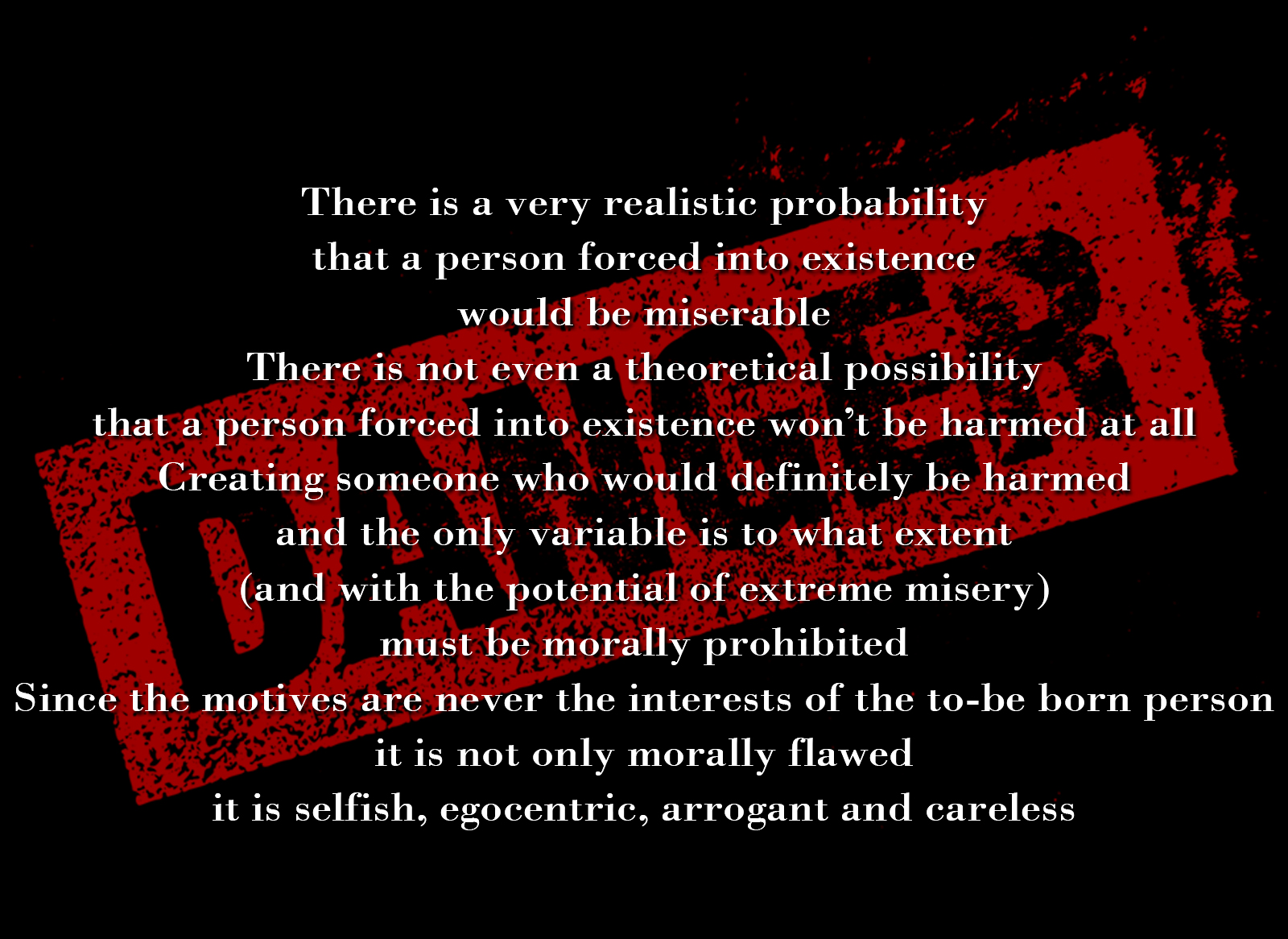
One of the strongest antinatalist arguments is the risk argument. Its power is that even if many people are glad that they were forced into existence (leave aside all the problems involved in such a claim), not every person feels that way, in fact many don’t, and no prospective parents can ever tell if the person they are creating would feel that way. No matter how hard the parents would try to make sure that their children would be happy, there are infinite ways in which life can easily turn from happy to miserable, with very little, and sometimes nothing, that the parents can do about it or control. The risk argument doesn’t necessitate thinking that life is inherently bad, but that a bad life is always a possibility. Even people who generally think that life is good, agree that existence is dangerous. There is always a risk that a person would endure extremely miserable life, and one shouldn’t take risks on another’s life.
There is no one who doesn’t suffer in life, and there are very few who are happy. People have a choice whether or not to create a sentient creature who would necessarily suffer and they choose to do so. They choose for someone to experience pain, to die, to fear death, to be frustrated, to get sick, to be broken hearted, to be offended, to be rejected, to be disappointed and etc. Pleasurable experiences might also occur, but not necessarily, and the negative ones will definitely happen in everyone’s life.
Pleasures are optional, happiness almost never is, pain is inevitable, and extreme suffering is very probable, at least during some parts of life. Why force someone into this condition?
How exactly could the parents of a suffering person justify their decision if they are confronted with their child? “We had a really good feeling that you’d be really happy”?!
Studies have shown that people’s personal optimism – the tendency to rate the relative likelihood that various positive and negative events would happen to them, as opposed to being likely to happen to the average person of their same age, sex, and surroundings – is more pronounced with regard to bad events than good events. People underestimate the chances of something bad happening to them, more strongly than they overestimate the chances of something good happening to them. In other words, they think that bad things are more likely to happen to other people, and good things are more likely to happen to them. This false bias is at its extreme ethical fallacious when it comes to procreation since people are underestimating the chances of something bad happening to their children. Most people’s reaction to horrors happening to their children is shock, but bad things happen to someone, and to someone’s parents. It shouldn’t be so shocking that something bad happens to their children, in fact, it is very probable that bad things, with different degrees of severity, would happen to everyone.
Even more than people’s personal optimism, the problem is that most people are not even considering the possibility of harms to their children, if they even think about the interests of their future children and not merely their own.
Nothing would be lost if a person won’t be created, however there is a potential for a very serious loss if the created person would be miserable.
Every time people decide to have a child, they are creating somebody who can suffer immensely. The only way to absolutely guarantee that a person won’t suffer is not to create it.
David Benatar’s antinatalism is not risk based, however he does write about a principle of caution, combined with his asymmetry:
“Followers of this principle recognize that nobody suffers if one mistakenly presumes a preference not to have been born, but people do suffer if one mistakenly presumes a preference to have been born. Imagine that one presumes that a fetus will develop into somebody who will be glad to have been born. One therefore does not abort the fetus. If one’s presumption was mistaken, and this fetus develops into somebody who was not glad to have been born, then there is somebody who suffers (for a lifetime) from one’s having made the wrong presumption. Imagine now that one makes the opposite presumption—that the fetus will develop into somebody who will not be glad to have been born. Therefore one aborts that fetus. If this presumption was mistaken, and this fetus would have developed into somebody who would have been glad to have been born, there will be nobody who suffers from the mistaken presumption.” (Benatar 2006 p.153)
Of course, many antinatalists object Benatar’s asymmetry, however, since existence necessarily means suffering but not necessarily happiness, we can say in that context and under this formulation, that there is an asymmetry derived from probability. Suffering is mandatory no matter who would be born, and happiness is optional and circumstance-dependent. During a lifetime, a person might experience greater pleasures than harms, but harms are inevitable while pleasures are optional.
As opposed to Benatar’s asymmetry argument whereby it is always better never to have been, according to a risk based asymmetry argument, even if it is not the case that it is always better never to have been, certainly at least some people would regret being forced into existence, however, undoubtedly, no person would ever regret not being forced into existence. Even if it is not always better never to have been, it is most certainly always better never to procreate, since there is always an option for a miserable life, at all stages of life, and to various degrees. No one can ever ensure that the person they are creating wouldn’t be miserable. No one can tell the outcome, and no one should gamble on the life of another.
There is a very realistic probability that a person forced into existence would be miserable. There is not even a theoretical possibility that a person forced into existence won’t be harmed at all. Creating someone who would definitely be harmed and the only variable is to what extent (and with the potential of extreme misery), must be morally prohibited. Given that the motives are never the interests of the to-be born person, it is not only morally flawed, it is selfish, egocentric, arrogant and careless.
Absolute Certainty
Though creating someone is a risk taken at that person expense, and it is truly a gamble on someone else’s life, in terms of general harm, procreation is not at all a gamble or risk, but absolute certainty. Creating a person is not taking a risk that harms would be inflicted, since it is absolutely certain that the person created would severely harm others. Even if the person created would have a great life which s/he is glad to have, it is absolutely certain that serious harms would be inflicted by that person.
When creating a new person, people take a risk that this person would have given consent to be harmed if it was possible, and that this person would feel that the pleasures outweigh the harms, but it is not a gamble that this person would cause a lot of harms to many others, it is a fact. Procreation is not taking a risk of causing harms, it is indifferently deciding to cause harms.
Many pro-natalists argue that although the worst outcomes of existence are awful, it is permissible to risk them happening if their probability is sufficiently low. I totally disagree that the probability of awful outcomes is sufficiently low, and even more than that I disagree that it is therefore permissible to risk someone else’s life. But even if we’ll put that aside for the sake of the argument, considering the harm to others, the probability of the worst outcomes of existence is not only not sufficiently low, it is absolutely certain.
The possibility of creating even one extremely miserable person is enough to make procreation unethical. The fact that it is estimated that there are tens of millions of suicidal people around the world makes procreation unethical and really cruel. And the fact that there are trillions of victims of humanity’s procreation makes the opposition to forced sterilization unethical and really cruel.
References
Benatar, David. Better Never to Have Been (New York: Oxford University Press, 2006)
Shiffrin, Seana. Wrongful Life, Procreative Responsibility, and the Significance of Harm Legal Theory 5, no. 2 (1999): 117–48


I read few line and reading continue
About antinatalism very few writing available. And in India Hindi language is most speaking and reading. I am also put my efforts to describe antinatalism philosophy in hindi also .